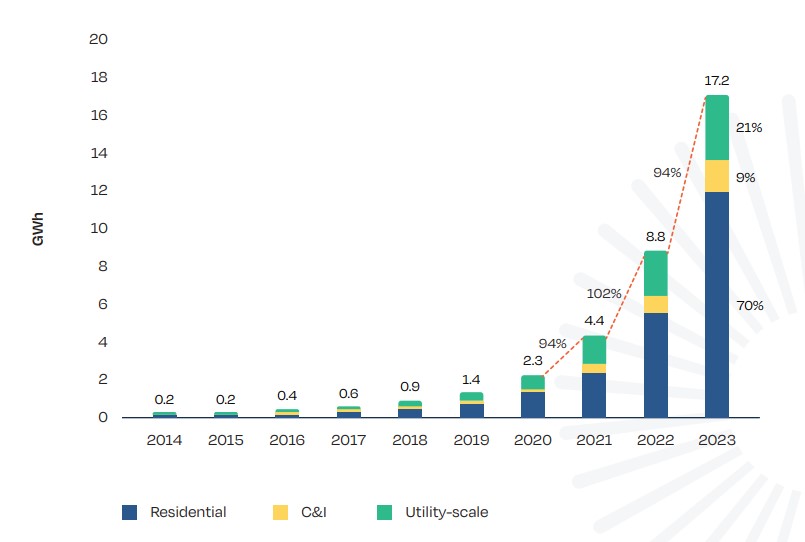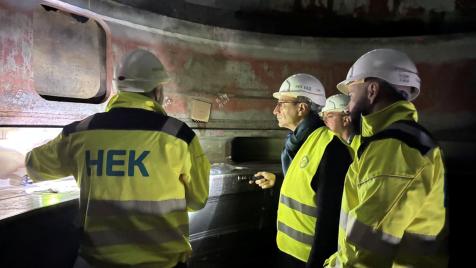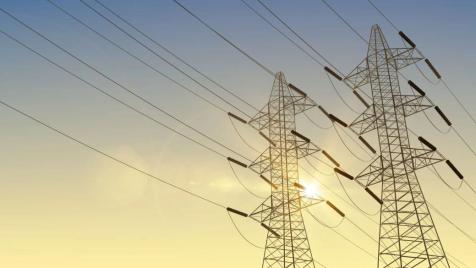Tomorrow's energy: Bulgaria is on the threshold of a renewable energy batteries revolution
For the Bulgarian financial institutions, however, electricity storage is still an unexplored topic
© ECONOMIC.BG / Krasimir Svrakov
Renewable energy resources are not a technology of the distant future – wind and solar generation are here and meet a significant part of current energy demand. There is also more room on the horizon for electricity storage batteries, which can stabilize the renewables boom by helping the grid.
In short, it is increasingly difficult for grid operators to balance the demand and supply of electricity. This is because wind and solar power are abundant at certain times of the day and season, which does not always match the demand for energy on the grid.
This is where new battery technologies come in, capable of storing renewable energy for hours, and then releasing it when needed. At a sufficient scale, energy storage can stabilize the grid and allow the system to run on clean energy 24/7.
Batteries are important
Throughout the European Union, the battery market is developing very dynamically, having increased 18 times in the last five years alone.
Nikola Gazdov, chairman of the Association for Production, Storage and Trading of Electricity in Bulgaria (APSTE), explains the growth of the market in the EU - so far mainly via small household battery installations in Germany, Italy, Great Britain, the Czech Republic set up to reduce electricity bills.
In Europe, the construction of large battery complexes connected to the grid is just beginning. This segment so far occupied a small part, below 25%. But the market is rapidly changing and we in Bulgaria are also contributing to the trend of switching to increasingly larger batteries. Currently, the leaders are Germany, Great Britain, and Italy. But the volatile energy markets in Central and Southeastern Europe give a strong market signal for storage investments in our region as well," adds the expert.
Europe: Annual Installed Capacity of Electricity Storage Batteries 2014-2023.

Source: SolarPowerEurope 2024
The example from Bulgaria shows that in just one week, two large-scale hybrid projects - solar power plants + storage batteries - have opened here - one in Razlog by Investo Partners, whose sole owner is the Austrian Renalfa IPP, and Solaris Park in Pernik, a project of Solaris Holding, a joint venture between the Bulgarian-German Sunotec and the main shareholders of Eurohold Bulgaria.
Their work is already reflected in the system load and generation data available on the website of the Electricity System Operator (ESO) and it can be seen that even at 9.00 pm, when the sun has set, between 50 and 60 MW is still being generated by solar, which is actually electricity from the batteries.
Storage systems are very important for all actors in the energy sector, such as renewable source producers, who have an incentive to install them to make sure that they can sell their electricity without restriction. They can also sell at a good price that is not too low during the hours when the other technologies produce electricity, as per Gazdov’s explanations.
Batteries thus allow cheap power from solar and wind to be "shifted" and turned into a profit at other times of the day when demand is greater, and prices are high. In this way, investors improve their business model, and businesses and households can feel relieved in peak demand hours, thanks to cheap electricity from renewable energy sources, Gazdov explained further.
The technology is also valuable to network operators as it enables them to manage the system in real time much better.
Batteries are very important for the Electricity System Operator and grid companies because they give them a lot of flexibility in managing an energy system, in which the share of renewables increases every year."
Last but not least, they are also useful and valuable for consumers, as Gazdov gave an example of large plants that can shape their profile well, reduce the costs of imbalances and be sure that they have high-quality electricity.
Industrial consumers can also benefit from market volatility. That is, charging the batteries when electricity prices are low and discharging them (consuming the stored electricity) during peak hours, when prices are also much higher."
Bulgaria is a pioneer
In addition to private investments, project proposals are currently being collected in Bulgaria under the European measure for financing electricity storage systems. It is expected that the latter will generate projects worth over 500 million euros to add at least 3,000 MWh of capacity. But the implementation of the measure remains questionable since Bulgaria has not yet submitted the documents necessary for the second payment under its Recovery and Resilience Plan (RRP), and it may turn out that there will be no money for batteries.
According to APSTE data, to date, there are under 200 MWh batteries put into operation in our country, but at least 1.5 GWh more are in the design process.
According to the expert, it should be taken into account that these are projects under development. It remains to be seen how many of them will materialize.
I am optimistic, I think a minimum of 1.5 GWh of new batteries will be commissioned in the next 18 months. With better development, we may even exceed 3 GWh", believes the chairman of APSTE.
According to Kaloyan Velichkov, executive director of Sunotec, if Bulgaria realizes the projects under the RRP, together with private investments, it will be one of the pioneers in the development of battery technology in Europe, excluding Great Britain.
“Looking at Europe, not many such facilities have been installed yet, and in Bulgaria, the market is actively developing, as batteries are currently more attractive to investors due to price fluctuations,” he believes.
Konstantin Nenov, CEO of Renalfa IPP, also sees Bulgaria as one of the leading countries in the EU for battery investments, in terms of market volume.
Bulgaria will very quickly reach a point where it will have the largest installed battery capacity, relative to the volume of the economy and energy consumption," he said.
He defines the Bulgarian investors in the renewables sector as open-minded, enterprising and ready to take risks and he believes that "this willingness to take risks will pay off".
However, Gazdov does not see Bulgaria as a leader in the implementation of the technology, explaining that other countries "are not sleeping" on this either.
There are a large number of projects in Romania and Greece under construction and about to be commissioned. Bulgaria is the only one in the EU that has not yet managed to absorb the available funds under the RRP, while Romania and Greece are already doing it - with hundreds of MWh already in the process of realization there".
Regulations are not an obstacle
Investors say they have no problems connecting the projects and the Electricity System Operator (ESO) welcomes battery technology.
According to Velichkov, the longest and most cumbersome procedures are always at the municipal level.
From a regulatory point of view and from the point of view of ESO, there is a very good understanding of the importance of such facilities, since without them further investments in renewables will not be possible," explains Nenov.
Connecting these projects to the grid takes between 3 and 9 months, depending on the scale.
Recently, a guarantee of 25,000 euros for each MW of installed capacity has entered into effect in Bulgaria, which investors must pay to confirm their intentions. Velichkov welcomes the state's reaction and believes that this is the way to eliminate speculators.
A problem for investors remains the Bulgarian financial institutions, for which "the topic of electricity storage is quite unknown, and it is something that should not be underestimated as one of the main obstacles on the way," says the director of Sunotec.
He adds that Renalfa's main goal is to eliminate the main drawback of renewable capacities - that they are an unpredictable source of energy.
More projects
Solaris Park is just the beginning for Sunotec, which is planning another 23 projects in Bulgaria, 14 of which will only be storage batteries with a total capacity of 500 MWh, the remaining 9 are hybrid projects, and they are expected to be put into operation by the end of 2025
We strive to close the portfolio of services we offer. Batteries are of great interest, as there is an opportunity to make an extremely serious connection between our support department, software and hardware engineering, and the management of the battery itself," says Kaloyan Velichkov.
Sunotec's strategy is to close contracts with end consumers, and thanks to batteries it sees an opportunity to offer a better product to its customers. Velichkov's vision is to move Sinotec from a builder of renewable projects to a provider of turnkey services and a plant operator.
The company is also approaching another emerging market in Bulgaria - city batteries for electricity storage. It already has such a project planned in a large Bulgarian city, but Velichkov did not specify which one. This will be the first such project in the country. The company is developing four more of this kind in German urban environments. The focus is on combined systems that can supply power to the grid, through a trader to the final consumer, and can also be used to generate revenue by having EV charging stations connected to it.
Translated by Tzvetozar Vincent Iolov

 Aleksandra Sotirova-Delcheva
Aleksandra Sotirova-Delcheva 


